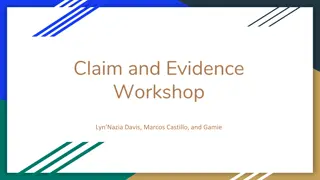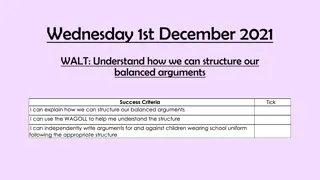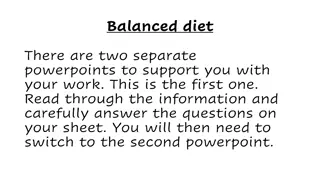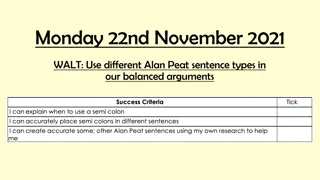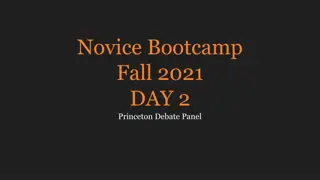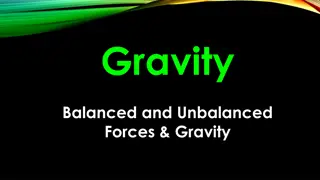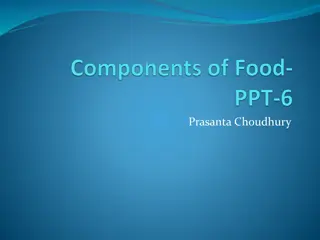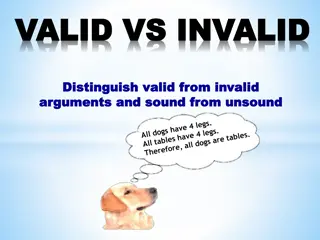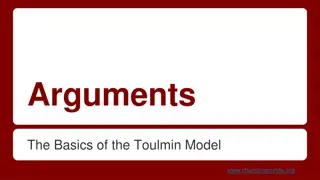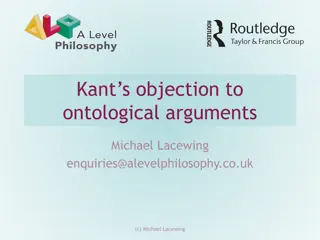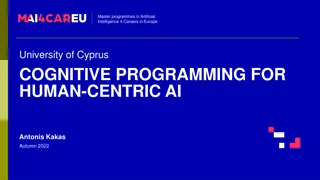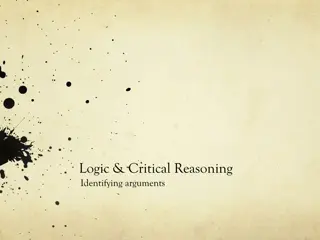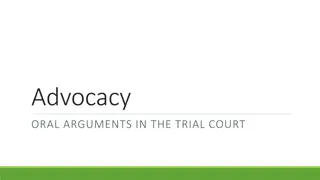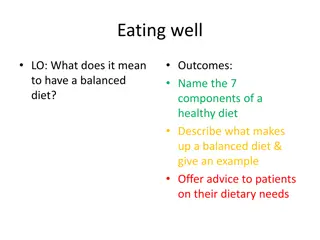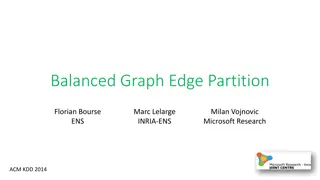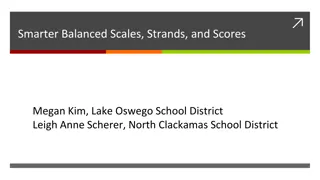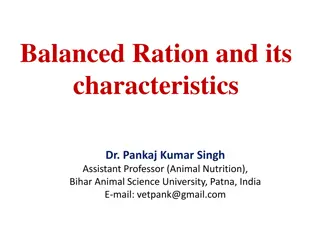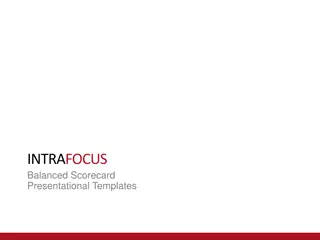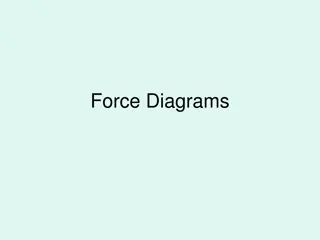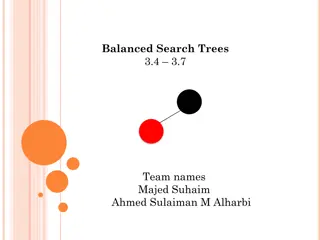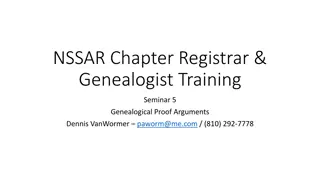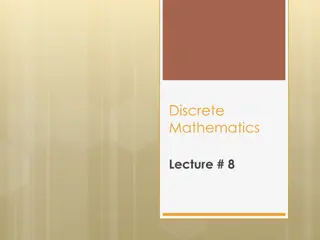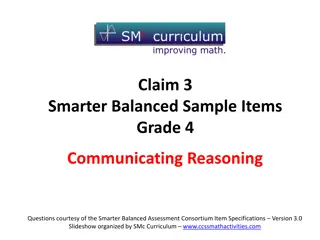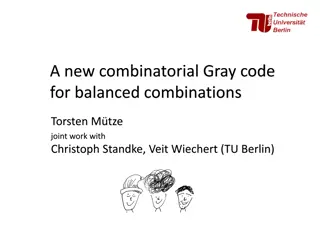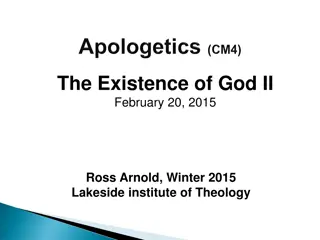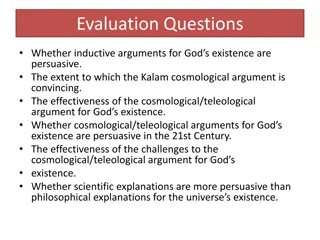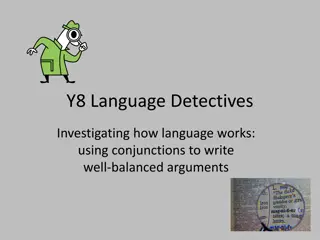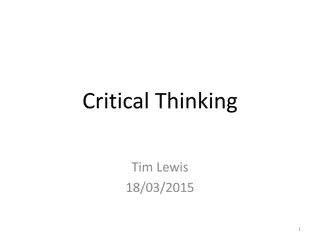Mastering the Toulmin Method for Constructing Persuasive Arguments
Learn how to effectively structure arguments using the Toulmin Method, which consists of Claim, Data, Warrant, Backing, Counterclaim, and Rebuttal elements. Explore reasoning and logic concepts, differentiate between inductive and deductive reasoning, and understand how to construct valid arguments
0 views • 30 slides
Understanding the Structure of Balanced Arguments
Explore the concept of using the third person in writing balanced arguments to maintain objectivity and structure. Learn about third person pronouns and the importance of being unbiased in your writing. Understand the significance of structuring your arguments and maintaining a clear order for effec
0 views • 11 slides
Understanding the Importance of a Balanced Diet
A balanced diet is essential for healthy growth and activity, as it provides all necessary nutrients for the body to function efficiently. This presentation explores what constitutes a balanced diet, the five major food groups, and the importance of water intake. Readers are encouraged to consider t
1 views • 6 slides
Mastering Alan Peat's Balanced Arguments with Different Sentence Types
Explore the use of various Alan Peat sentence types in crafting balanced arguments, focusing on incorporating semi-colons effectively. Engage in interactive activities and practice sessions to enhance your skills in creating compelling arguments. Dive into examples and exercises to refine your under
1 views • 12 slides
Mastering Debate: Essential Strategies and Techniques
Learn key concepts like argument structure, points of clarification, and how to make compelling arguments in a debate setting. Discover the importance of warrants, impacts, and implications in formulating strong arguments. Explore tips on coming up with effective arguments and understanding differen
0 views • 47 slides
Mastering Final Focus in Debates
Final Focus, a crucial 2-minute speech at the end of a debate, serves as your last chance to persuade the judge of your victory. It involves comparing key voters and emphasizing the impact of your arguments. Weighing key voters is essential, with a focus on demonstrating why the scale tips in your f
1 views • 4 slides
Understanding Gravity and Balanced/Unbalanced Forces in Physics
Explore the fundamental concepts of gravity and balanced/unbalanced forces in physics. Gravity is the force that pulls objects toward each other, acting universally. Balanced forces maintain object stability, while unbalanced forces can cause motion changes based on direction, strength, and mass. Di
0 views • 9 slides
Importance of Roughage, Water, and Balanced Diet in Maintaining Health
Understanding the significance of roughage, water, and a balanced diet is essential for maintaining a healthy body. Roughage adds bulk to food, aiding in digestion and preventing constipation. Water is crucial for various bodily functions, including nutrient absorption and waste removal. A balanced
0 views • 13 slides
Understanding Reasonable Arguments vs. Pseudo-Arguments
The provided content focuses on distinguishing between reasonable arguments and pseudo-arguments through thought-provoking questions such as the ethical treatment of animals, city subsidies for sports venues, and subjective opinions on aesthetics. It also explains the structure of an argument, highl
0 views • 18 slides
Understanding Valid and Invalid Arguments in Logic
In logic, arguments consist of premises supporting a conclusion, with deductive arguments claiming logical necessity. Valid arguments have premises implying the conclusion, making them deductively valid. For example, if all actors are robots and Tom Cruise is an actor, then logically Tom Cruise must
0 views • 25 slides
An Examination of Ontological Arguments for God's Necessary Existence
Various ontological arguments, such as Malcolm's and Anselm's, propose that the existence of God is logically necessary, grounded in the concept of God as the greatest possible being. These arguments challenge the coherence of the concept of God and counter objections, like Kant's claim that existen
2 views • 10 slides
Guide to Planning Balanced Diets for All Age Groups
Learn about the importance of balanced diets, nutritional needs for different age groups, and how to plan balanced menus using the food pyramid. Discover tips for weaning babies onto solid foods, including the introduction of iron-rich cereals and vitamin C sources. Ensure babies' diets are free fro
0 views • 39 slides
Understanding the Toulmin Model for Effective Argumentation
The Toulmin Model provides a structured approach to crafting and evaluating arguments, consisting of key components like claims, grounds/data, and warrants. It emphasizes the importance of using evidence and reasoning to support claims effectively. By understanding this model, one can enhance the pe
0 views • 13 slides
Kant's Critique of Ontological Arguments
An exploration of Kant's objection to ontological arguments, examining the flaws in the reasoning of Anselm and Descartes. Kant argues that existence is not a predicate and does not enhance the concept of a being. Therefore, ontological arguments cannot prove the existence of God solely through conc
0 views • 7 slides
Understanding Argumentation and Realization in AI Master Programmes
Exploring the concept of argumentation and its realization in artificial intelligence master programmes, focusing on the construction, evaluation, and implementation of arguments through cognitive programming. The framework involves structured argumentation, conflict relations, and strength/preferen
1 views • 31 slides
Understanding Logic and Critical Reasoning: Identifying Arguments
In the study of logic and critical reasoning, identifying arguments is a fundamental task. Arguments consist of premises supporting a conclusion, and they can be identified by specific indicators and techniques. Understanding argument structure and types of support, such as deductive and inductive,
2 views • 15 slides
Guide to Oral Arguments in Trial Court
Learn how to conduct oral arguments in a trial court, including the steps for both the movant and respondent, strategies for making strong arguments, and tips for responding effectively. This comprehensive guide covers the dos and don'ts of oral arguments, emphasizing the importance of preparation,
0 views • 9 slides
Supporters of Slavery in the 19th Century: Legal, Religious, and Economic Arguments
In the 19th century, defenders of slavery utilized legal arguments by denying citizenship rights to blacks, religious arguments by justifying ownership and guidance through biblical references, and economic arguments by comparing treatment of slaves in the South to conditions of workers in the North
0 views • 4 slides
Understanding Command-line Arguments and Errors
Learn how to utilize command-line arguments in Python scripts to enhance flexibility and parametrize functions for various inputs. Explore ways to access and utilize command-line arguments effectively, while handling errors gracefully.
0 views • 30 slides
Understanding the Components of a Balanced Diet
Exploring the importance of a balanced diet, this content covers the seven components of a healthy diet, explains what constitutes a balanced diet, gives examples, provides dietary advice to patients, and offers interactive tasks to enhance understanding of nutrition.
0 views • 7 slides
Balanced Graph Edge Partition and Its Practical Applications
Balanced graph edge partitioning is a crucial problem in graph computation, machine learning, and graph databases. It involves partitioning a graph's vertices or edges into balanced components while minimizing cut costs. This process is essential for various real-world applications such as iterative
0 views • 17 slides
Understanding Smarter Balanced Assessment System
Smarter Balanced Assessment System includes scoring students from level 1-4 with scale scores representing achievement standards. Level 3 signifies readiness for non-remedial college courses, impacting graduation requirements. Essential Skills are evaluated through various assessments, with ongoing
0 views • 11 slides
Characteristics of a Balanced Ration for Animals
A balanced ration is crucial for providing essential nutrients in the right amounts to animals for proper nourishment and physiological functions throughout the day. It should be properly balanced, palatable, have a variety of feed ingredients, and contain adequate mineral matter to ensure optimal h
1 views • 19 slides
Understanding the Balanced Scorecard Methodology
The Balanced Scorecard is a strategic planning and management approach that aligns business activities with organizational vision and strategy, enhances communications, and monitors performance against strategic goals. It involves identifying key financial and non-financial measures, setting targets
0 views • 10 slides
Understanding Force Diagrams and Balanced/Unbalanced Forces
Explore the concepts of force diagrams, balanced forces, and unbalanced forces through visual examples and explanations. Learn how balanced forces keep objects stationary or at a constant speed, while unbalanced forces cause movement and changes in direction. Practice calculating resultant forces an
1 views • 11 slides
Understanding Balanced Vortex Dynamics in Tropical Cyclones
Exploring the application of Potential Vorticity (PV) thinking in understanding tropical cyclones, focusing on Wayne Schubert's contributions to balanced vortex dynamics. The discussion covers the beauty of PV-thinking in relation to baroclinic instability, the analogy between baroclinic wave dynami
0 views • 15 slides
Understanding Height-Balanced Binary Trees and AVL Trees
The efficiency of tree operations like searching, insertion, and deletion is closely tied to the tree's height. Maintaining a balanced height in trees, such as AVL trees, ensures O(log2n) complexity for efficient operations. Learn about height-balanced binary trees, how to check if a tree is balance
0 views • 27 slides
Importance of Nutrition and Balanced Diet for Health and Immunity
Leading a healthy lifestyle is crucial for improving immunity, which involves maintaining a balanced diet, getting enough sleep, regular exercise, personal and environmental hygiene, and staying optimistic. A balanced diet includes a variety of foods to ensure sufficient nutrients for a strong body
0 views • 23 slides
Understanding Balanced Search Trees and Red-Black Trees
Balanced Search Trees ensure efficient data retrieval by maintaining balancedness properties within the tree structure. Red-Black Trees are a type of binary search tree with specific coloring rules that help in balancing and efficient searching. Learn about the structure, properties, and worst-case
0 views • 75 slides
Analyzing Arguments in English Debates: A Critical Approach
Explore and critique various arguments presented in English debates, including topics like dietary recommendations, digestion issues with Japanese rice, and driving skills in different weather conditions. Learn how to evaluate evidence, causality, and persuasiveness in arguments to develop critical
0 views • 19 slides
Mastering Academic Writing Moves: The Art of Summarizing
In academic writing, mastering the art of summarizing is crucial for persuasive arguments. By engaging in dialogue with others and summarizing their arguments, writers can strengthen their position. It is important to strike a balance between the original author's ideas and your own, emphasizing asp
0 views • 15 slides
An Overview of Debate: Propositions, Teams, and Formats
Debate is a regulated discussion between two matched sides discussing a proposition, with the affirmative arguing for change and the negative defending the status quo. The standard debate format involves constructive arguments followed by rebuttals from both sides. The roles in a debate include the
0 views • 47 slides
Genealogical Proof Arguments and SAR Standard of Proof
This detailed content covers the definitions and components of genealogical proof arguments, proof summaries, and the SAR standard of proof. It explains the importance of evidence quality, source citations, and analysis in establishing acceptable genealogical conclusions for SAR membership applicati
0 views • 22 slides
Understanding Valid and Invalid Arguments in Discrete Mathematics
Concepts of valid and invalid arguments in discrete mathematics are explored through examples. Learn how to determine the validity of arguments based on premises and conclusions. Practice using truth tables to evaluate argument forms. Enhance your logical reasoning skills in Discrete Mathematics.
0 views • 22 slides
Grade 4 Smarter Balanced Sample Items for Communicating Reasoning
Explore interactive questions from the Smarter Balanced Assessment Consortium for Grade 4 students to practice communicating reasoning skills. Questions involve creating comparisons with fractions, completing number statements, identifying correct conditions in arguments, and solving math problems u
0 views • 29 slides
A New Combinatorial Gray Code for Balanced Combinations
This research work by Torsten Mütze, Christoph Standke, and Veit Wiechert introduces a new combinatorial Gray code for balanced combinations, focusing on a-element subsets and flaws in Dyck path representation. The study explores various aspects of balanced combinations, their flaws, and the relati
0 views • 30 slides
Philosophical Apologetics: Arguments for the Existence of God
Philosophical apologetics presents various arguments for the existence of God, including the ontological, cosmological, teleological, moral, transcendental, and presuppositional arguments. These arguments cover diverse aspects such as change, causality, design, contingency, miracles, consciousness,
0 views • 10 slides
Evaluating Arguments for God's Existence in the 21st Century
Exploring the persuasiveness of inductive arguments for God's existence, assessing the Kalam cosmological argument, and evaluating the effectiveness of cosmological/teleological arguments. Delving into whether scientific explanations surpass philosophical ones, the strengths and weaknesses of these
0 views • 16 slides
Mastering the Art of Writing Persuasive Arguments with Conjunctions
Dive into the effective use of conjunctions to craft well-balanced arguments through engaging dialogues, examples, and strategies. Explore how contrasting ideas can be skillfully presented to strengthen your argumentative writing in various scenarios, from educational debates to environmental discus
0 views • 10 slides
Understanding Critical Thinking, Hypotheses, and Arguments
Explore the concepts of critical thinking, hypotheses, and arguments in this informative content. Learn about the definition of hypotheses, the nature of arguments, and syllogisms. Delve into the world of logical reasoning and the foundations of thought processes.
0 views • 32 slides
